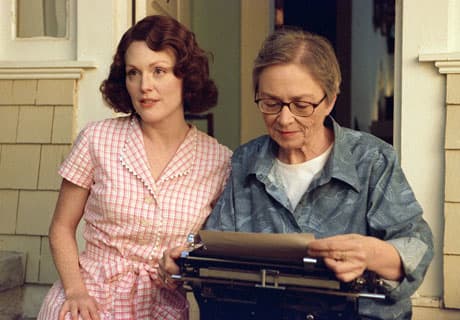It may not be bravura filmmaking, but this Prize Winner is defiant in its skilful playing of both sides of the street.
The 1950s-set true story deals with the trials of Evelyn Ryan, a mother of ten and the wife of a raging alcoholic named Kelly (Woody Harrelson). Desperate for extra cash, she endeavours to enter as many jingle-writing contests as she can possibly find, and she proves so good at it that she manages to scrape her family by. Scrapes, not coincidentally, are what Kelly tends to get his family into, meaning Evelyn must be stoic in her deployment of alliteration and metre.
The whole idea will set off alarm bells in people's heads, with some resenting a familiar guilt trip and others fixed on the idea of punishing the surely evil husband. But the movie does something unexpected: it tears a strip off the whole "dad works/mom keeps it together" dynamic while not assigning blame to the hapless folk who inherited it. Thus Harrelson's character comes off as enormously irresponsible but pathetically understandable, noticing the person underneath the ridiculous gender role and the "my home is my castle" ethic. Without letting him off the hook, it shows how things could be different, and holds out the possibility for change.
To be sure, Jane Anderson's direction is highly conventional, with "period" design taking the place of visual articulation and everything looking like it just came out of the box. But Evelyn's superhuman resolve proves a formidable reproach to those who write off what was formerly known as "women's work," while extending its expose far enough to include all of patriarchy's confused children. (Dreamworks)
The 1950s-set true story deals with the trials of Evelyn Ryan, a mother of ten and the wife of a raging alcoholic named Kelly (Woody Harrelson). Desperate for extra cash, she endeavours to enter as many jingle-writing contests as she can possibly find, and she proves so good at it that she manages to scrape her family by. Scrapes, not coincidentally, are what Kelly tends to get his family into, meaning Evelyn must be stoic in her deployment of alliteration and metre.
The whole idea will set off alarm bells in people's heads, with some resenting a familiar guilt trip and others fixed on the idea of punishing the surely evil husband. But the movie does something unexpected: it tears a strip off the whole "dad works/mom keeps it together" dynamic while not assigning blame to the hapless folk who inherited it. Thus Harrelson's character comes off as enormously irresponsible but pathetically understandable, noticing the person underneath the ridiculous gender role and the "my home is my castle" ethic. Without letting him off the hook, it shows how things could be different, and holds out the possibility for change.
To be sure, Jane Anderson's direction is highly conventional, with "period" design taking the place of visual articulation and everything looking like it just came out of the box. But Evelyn's superhuman resolve proves a formidable reproach to those who write off what was formerly known as "women's work," while extending its expose far enough to include all of patriarchy's confused children. (Dreamworks)
